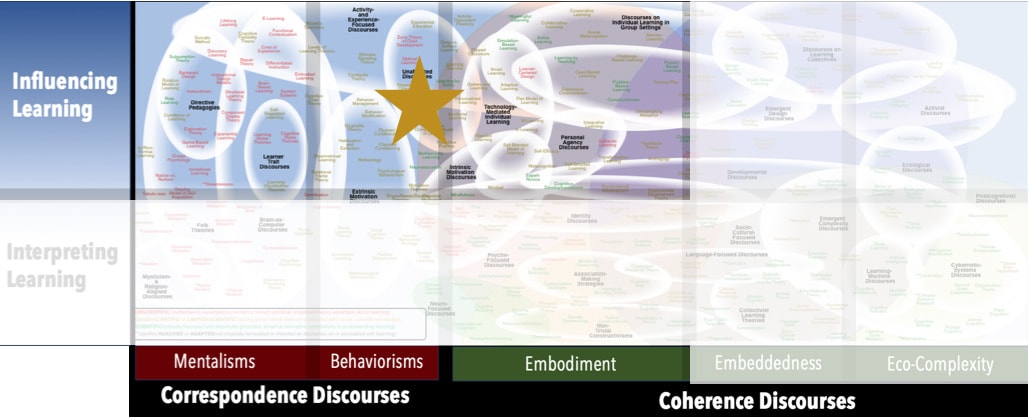Focus
Activity-focused formats to support learningPrincipal Metaphors
In popular usage, Experiential Education does not align with a particular theory of learning, which means that almost any theory of learning can be aligned with it. Consequently, the theory makes just as much sense whether invoking the Acquisition Metaphor or the wildly incompatible Radical Constructivism. That said, on close analysis, the perspective most often invoked within Experiential Education appears to fit most closely with the cluster of associations around the Attainment Metaphor:- Knowledge is … a territory/area/domain/field
- Knowing is … mastered/attained goals
- Learner is … an active agent (individual)
- Learning is … attaining (journeying, arriving at, reaching, progressing, accomplishing, achieving)
- Teaching is … leading, guiding, directing, facilitating
Originated
1980sSynopsis
Usually identified by many as a “philosophy of education,” Experiential Education is a perhaps more accurately described as an umbrella notion that can be applied to any educational method in which practical skills, conceptual understandings, and/or social values are supported through direct experience and focused reflection. Most versions of Experiential Education call for some degree of learner self-direction, and many are oriented toward some manner of social engagement and/or contribution.Commentary
While once a disruptive, core component of the Progressivism, Experiential Education has lost its original edge and, in many contexts, serves as little more than a weak assertion that students who are involved in “doing things” may learn more (or, at least, be less disengaged) than those who are less active.Authors and/or Prominent Influences
John DeweyStatus as a Theory of Learning
Experiential Education is not a theory of learning. As well, in popular usage, it does not align with any particular theory of learning.Status as a Theory of Teaching
Experiential Education is about teaching, but in its popular usage it’s too diffuse to describe as a theory of teaching.Status as a Scientific Theory
Because (1) the phenomenon of learning is not treated consistently or critically and (2) the frame does not lend itself to coherent or comprehensive research (since it can be fitted to too many methods and emphases), Experiential Education cannot be described as a scientific theory.Map Location

Please cite this article as:
Davis, B., & Francis, K. (2019). “Experiential Education” in Discourses on Learning in Education. https://learningdiscourses.com.
⇦ Back to Map
⇦ Back to List
